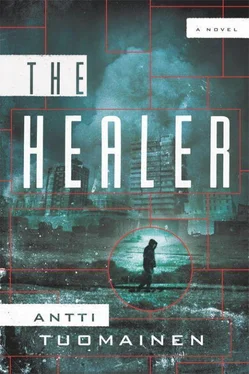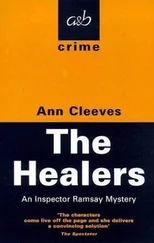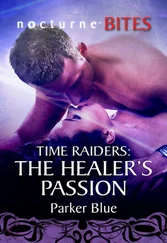* * *
ON THE WAY, HAMID stopped at a service station. He hopped lightly out of the car, went to the pump, inserted his card and keyed in his code, and started to fill up. I got out of the car, too, got a blast of heady, metallic gasoline fumes, and walked the couple of steps to the counter. The fog was still thick, and the air felt stagnant and damp on my skin.
The former culinary school behind the service station stood silent, its windows black. There were about a dozen people milling around in front of it, men and women who communicated through roars, grunts, and half-syllable shouts. They had a plastic bottle that they were passing around and lifting to their lips.
A large, high SUV with darkened windows pulled into the station on the other side of the pump. Both the driver’s and the passenger’s doors opened and two Slavic-looking men the size of bulldozers appeared and dropped to the ground. One of them went to the gas pump and the other stood next to the car. I couldn’t see inside the car, but I made an educated guess that there was a man in the backseat who would never be able to spend all his money.
The service station was the world in miniature: petroleum under the ground, the masses in their vehicles, and a few who enriched themselves on the distress of the rest. I suppose we all had our place here at this gas station, and in the universe.
Hamid put the nozzle back on the side of the pump with a clank, waking me from my thoughts. His timing was excellent because the bulldozer guarding the car had noticed me staring and, judging by his expression, was about to come over and ask me if I had anything to say to him. And I couldn’t honestly say that I did.
Hamid backed the taxi up from the pump and headed toward the center of town.
The plaza at the train station was nearly full of people and cars. Hamid dropped me off in front of the shopping center across from the station. I dodged people, went into the café, and got in line. While I waited I heard bits of conversation in at least ten different languages. Some of them I understood, most I didn’t. I bought a coffee and a sandwich that was so tightly wrapped in thin paper that only the golden-brown tip told me that it was some kind of bread. I paid and looked around for someplace to sit. I got lucky when an African family gathered its coats and bags and headed toward the railway station.
I sat down, and when a man with a broad smile asked in Spanish-accented English if he could have the extra chairs, I told him yes, except for one. One was saved for Johanna’s editor, Lassi Uutela. I didn’t say that part out loud.
The roll was dry and contained the thinnest slice of cheese I’d ever seen. Had it been any thinner, I wouldn’t have seen it.
I’d finished the sandwich and coffee when Lassi arrived.
He shook my hand, glanced into my eyes only in passing, pulled out a chair, threw his left leg over his right, slapped his hair into place, and ran a hand over the stubble on his face. Then he picked up his spoon and stirred his coffee.
He looked as tired and world-weary as he had the day before, but I understood better now that his battered, worn-out appearance was a kind of armor that made it easier to make decisions, to play for time, and to conceal his own thoughts and their resulting actions. The whole image of the exhausted but tough newspaperman, red around the eyes, his beard always at the right stage of stubble, was just a role made to measure for an experienced player.
“I’ve got a pretty tight day today,” he said. He nodded toward his offices across the street. “The place is in chaos. A lot of articles just about to come together. That’s why I suggested meeting here. Get a little peace.”
“Right,” I said, and looked around me. The people of all ages and colors, the multitude of languages, and the clatter of the café made it a pleasant place to meet, of course, but it certainly would have been more peaceful someplace else. “I haven’t looked at this morning’s paper, but I’m sure there must have been an article about that singer and her horse you were talking about yesterday.”
Lassi still didn’t look me in the eye.
“Did you want to praise me for a successful piece of journalism?”
He slurped his coffee, the cup steady in his hand, his eyes not evading mine by a millimeter now.
“Why not meet at your office?” I asked.
“Like I said,” he sighed, putting his cup gently on the table and pushing it a few centimeters away from him, “it’s more peaceful here.”
“First you don’t answer my calls, then when I send a message that I’m coming to your office, you call and suggest we meet somewhere else. It makes me wonder—who’s at your office who isn’t supposed to see me?”
He looked at me questioningly, again with that tired skepticism that said he was perhaps a bit intrigued, but also convinced that I was an imbecile and a nuisance.
“Who isn’t supposed to know that Johanna’s missing, and her husband’s looking for her?” I asked.
He didn’t speak for a moment.
“Keep on babbling,” he said. “I don’t know what you’re talking about.”
“OK, let’s forget that for a moment. Tell me why you called me to tell me Gromov was dead.”
Lassi looked at me almost pityingly.
“I was trying to help,” he said.
“That’s all?”
“That’s all,” he repeated with a sigh.
“I don’t remember exactly how you put it, but you said something about how much you value your employees.”
“It’s true,” he said.
“Then tell me why Johanna’s disappearance hasn’t caused you to act. You know that Gromov is dead. You have reason to believe that Johanna is in at least some kind of trouble. You have reason to believe that the trouble she’s in might have something to do with the family murders she was writing about.”
“You’re a poet, Tapani. A journalist would get to the heart of the matter, think about what the truth is, and report on it. You’re building stories, fairy tales. You’re making things up. On the other hand, imagination is a good thing. We need it these days.”
“No editor would pass up a story like this,” I said.
“I don’t see any story in it.”
“You don’t want to see one. And I want to know why.”
Lassi leaned back in his chair.
“You sound like your wife,” he said. “And that’s not a compliment.”
“What have you got against Johanna?”
He shook his head.
“The question is, what has Johanna got against me?”
“Your attitude, for one thing, I would imagine.”
“I’m trying to put out a newspaper.”
“And Johanna’s not?”
“Not the same newspaper. I told you what our situation is. Some people get it, and some people don’t.”
“And Johanna didn’t?”
I glanced outside. The fog looked like it was pressing against the windows, trying to get in.
“Not at all,” Lassi said, leaning still farther back. “We’re living in rather difficult times, in many ways, but one thing is beginning to become clear. The kind of truth that a few journalists like Johanna are still looking for just doesn’t exist anymore. There’s nothing to rest it on, nothing to base it on, nothing to cultivate it. I could talk for a long time about the end of history, the disappearance of values, the pornographication of everything. But stuffed shirts like you know better. It was what it was. We’re trying to put out a paper in the environment we’re in now. I have a blank page that I have to fill with pictures and text that looks like news, something that will interest people. And what are people interested in? Today it’s an R&B singer and her horse. Tomorrow it’s a celebrity caught shoplifting and exposing herself, if it’s up to me. We have surveillance photos, close-ups almost, of this woman stuffing an MP3 player in her underwear, and while she’s at it you can see practically everything, if you know what I mean.”
Читать дальше












